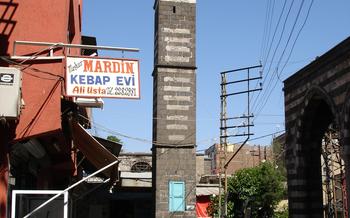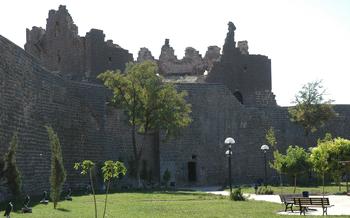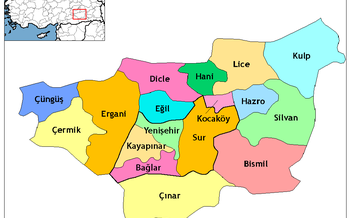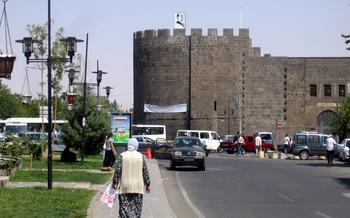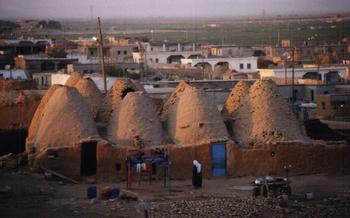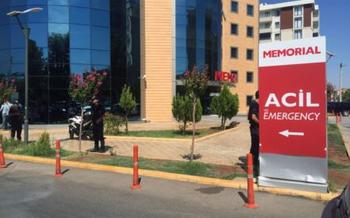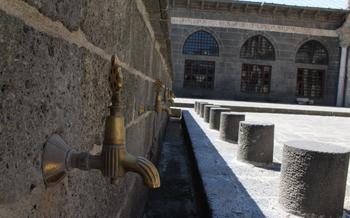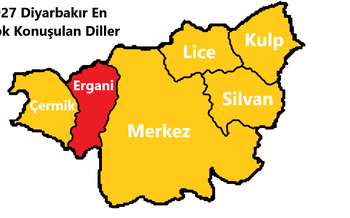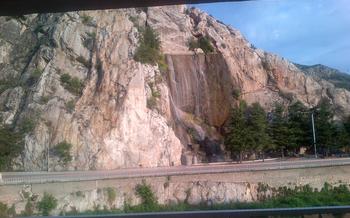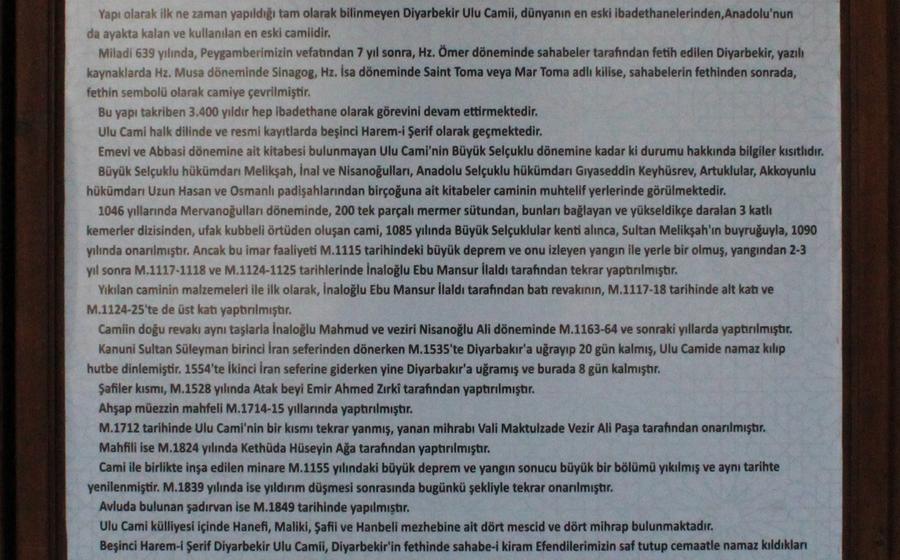
Dicle Valley
- Historical Background
- Arrival
- Accommodation
- Food
- Things to Do
- Off the Beaten Path
- Festivals and Events
- Shopping
- Nightlife
- Safety
- Budget
- Language
- Climate
- Etiquette
- Insider Tip
Historical Background
Diyarbakır, a city in southeastern Turkey, has a rich and diverse history that dates back to the ancient Mesopotamian civilization. Located on the banks of the Tigris River, Diyarbakır was once part of the powerful Akkadian and Babylonian empires. In the 6th century BC, the city was conquered by the Persians and became part of the Achaemenid Empire. Alexander the Great conquered the city in 331 BC, and it subsequently became part of the Hellenistic Seleucid Empire.
In the 1st century AD, Diyarbakır was incorporated into the Roman Empire and became a major city in the province of Mesopotamia. The Romans built a massive fortress in the city, which still stands today. In the 4th century AD, Christianity became the official religion of the Roman Empire, and Diyarbakır became a center of Christian worship.
In the 7th century AD, Diyarbakır was conquered by the Arab Muslims and became part of the Umayyad Caliphate. The city flourished under Muslim rule, and it became a center of Islamic culture and learning. In the 11th century AD, Diyarbakır was conquered by the Seljuk Turks, and it became part of the Seljuk Empire. The Seljuks built many mosques and madrasas (Islamic schools) in the city, and they also expanded the city's fortifications.
In the 13th century AD, Diyarbakır was conquered by the Mongols, and it became part of the Mongol Ilkhanate. The Mongols destroyed much of the city, but they also rebuilt it and made it a major center of trade. In the 14th century AD, Diyarbakır was conquered by the Mamluks, and it became part of the Mamluk Sultanate. The Mamluks ruled the city for over a century, and they built many mosques and madrasas.
Arrival
Diyarbakir is well-connected to the rest of Turkey by air, land, and rail.
Diyarbakir Airport (DIY) is located about 7 kilometers from the city center. There are several flights per day to and from Istanbul, Ankara, and other major Turkish cities. From the airport, you can take a taxi or bus to your hotel or hostel.
There are also several bus companies that offer direct service to Diyarbakir from major Turkish cities such as Istanbul, Ankara, and Izmir. The bus station is located about 2 kilometers from the city center.
If you prefer to travel at your own pace, you can rent a car from one of the many car rental companies in Diyarbakir. The city is well-connected to the rest of Turkey by a network of highways.
Once in Diyarbakir, you can easily get around the city by bus, taxi, or dolmuş (shared taxi).
Accommodation
Diyarbakir offers a wide range of accommodation options to suit all budgets and preferences. For a luxurious stay, consider booking a room at one of the city's many five-star hotels, such as the Hilton Diyarbakir or the Radisson Blu Diyarbakir. These hotels offer stunning views of the city, world-class amenities, and impeccable service.
For budget-minded travelers, there are plenty of hostels and guesthouses available. These offer a more basic level of comfort but are still clean and safe. Some popular options include the Diyarbakir Backpackers Hostel and the Mesopotamia Hostel.
If you want to experience local life, consider renting an apartment or staying with a Turkish family through Airbnb. This is a great way to learn about Turkish culture and make some new friends.
No matter where you choose to stay, make sure to book your accommodation in advance, especially if you are traveling during the peak season.
Food
Diyarbakir is a foodie's paradise, with a diverse and delicious cuisine that reflects its rich history and culture. From traditional Kurdish dishes to Turkish classics, the city's restaurants and markets offer a tantalizing array of flavors and textures to satisfy even the most discerning palate.
Local Cuisine: Diyarbakir's local cuisine is a blend of Kurdish, Turkish, and Middle Eastern influences, resulting in unique and flavorful dishes. Manti (Turkish ravioli), kaburga dolması (stuffed lamb ribs), and içli köfte (stuffed meatballs) are just a few of the must-try delicacies.
Street Food: For a taste of local life, head to the city's bustling streets where vendors sell mouthwatering snacks like çiğ köfte (raw meatballs), midye dolma (stuffed mussels), and lahmacun (Turkish pizza).
Restaurants: Diyarbakır is home to a wide range of restaurants, from traditional Kurdish eateries to upscale Turkish grills. For a truly authentic experience, try Banya Restaurant, which has been serving traditional Kurdish cuisine for over a century.
Markets: The city's markets are a great place to find fresh produce, spices, and local delicacies. The Diyarbakir Farmers' Market is a particularly good spot to sample the region's agricultural bounty.
Whether you're a food enthusiast or simply looking for a delicious meal, Diyarbakir has something to offer everyone. Be sure to come hungry and ready to explore the city's culinary delights!
Things to Do
Diyarbakır offers a wealth of experiences for visitors. At the heart of the city, the Great Mosque of Diyarbakir stands as the oldest mosque in Anatolia. Built in the 11th century, its impressive architecture and intricate tilework captivate visitors. Explore the Diyarbakir Fortress, a UNESCO World Heritage Site, and immerse yourself in its rich history. Discover the Museum of Kurdish Culture to gain insights into the region's diverse heritage.
For a unique perspective, embark on a boat trip on the Dicle River. Admire the stunning views of the city from the water and experience the tranquility of the river's gentle currents. Take advantage of the opportunity to savor the flavors of local cuisine at one of the many restaurants along the riverbanks, offering a delightful culinary experience.
Off the Beaten Path
While Diyarbakır itself offers a wealth of historical and cultural attractions, venturing off the beaten path will reward you with even more hidden gems. A short drive from the city, you'll find the ancient city of Hasankeyf, a UNESCO World Heritage Site.
Festivals and Events
Diyarbakır, a city rich in culture and history, is also home to a number of exciting festivals and events throughout the year. These events offer the perfect opportunity to experience the city's vibrant energy and immerse yourself in its unique traditions.
Diyarbakır International Film Festival: This prestigious festival showcases a diverse range of local and international films, making it a must-visit for film enthusiasts. The festival is typically held in the fall and features a variety of screenings, workshops, and discussions.
Diyarbakır Music Festival: Celebrates the rich musical heritage of the region. The festival brings together musicians from all over Turkey and the world, and features performances of traditional Kurdish music, as well as contemporary and classical music. It is held in the summer and offers a chance to experience the city's lively music scene.
Diyarbakır Food Festival: This festival is a culinary extravaganza that showcases the delicious flavors of Diyarbakır cuisine. Visitors can sample a wide variety of local dishes, including traditional kebabs, gözleme (flatbread filled with cheese, vegetables or meat), and künefe (a sweet pastry filled with shredded phyllo dough, nuts and cheese).
Shopping
Diyarbakir is a great place to shop for traditional handicrafts, carpets, jewelry, and spices. The city is home to a number of bazaars and markets, where you can find everything from handmade pottery to antique silver.
One of the most popular souvenirs from Diyarbakir is a carpet. The city is known for its high-quality carpets, which are made from wool or silk and often feature intricate designs. You can find carpets in all sizes and price ranges, so you're sure to find one that fits your budget.
Another popular souvenir from Diyarbakir is jewelry. The city is home to a number of goldsmiths who make beautiful jewelry using traditional techniques. You can find everything from delicate necklaces to chunky bracelets, and the prices are very reasonable.
If you're looking for something to spice up your cooking, be sure to visit one of Diyarbakir's spice markets. You'll find a wide variety of spices, including cumin, coriander, paprika, and turmeric. The spices are fresh and flavorful, and they're very affordable.
No matter what you're looking for, you're sure to find it in Diyarbakir. The city is a shopper's paradise, and you're sure to find something to take home with you.
Nightlife
Diyarbakır may not be the first city that comes to mind when thinking about nightlife, but it does offer a variety of options for those looking to let loose and have some fun. From traditional Turkish bars to modern nightclubs, there is something for everyone in Diyarbakır.
For those looking for a more traditional experience, there are several meyhanes (Turkish taverns) in Diyarbakır where you can enjoy live music, traditional Turkish cuisine, and drinks. These meyhanes are usually located in the old town and offer a unique and authentic Turkish experience.
If you are looking for something more lively, there are several nightclubs in Diyarbakır that play a variety of music, from Turkish pop to international hits. These nightclubs are usually located in the newer parts of the city and offer a more modern and cosmopolitan experience.
No matter what your taste in music or atmosphere, you are sure to find something to your liking in Diyarbakır. So put on your dancing shoes and get ready to have a night to remember!
Safety
Diyarbakır is generally a safe city for travelers, but it's always important to be aware of your surroundings and take necessary precautions. Here are a few tips to help you stay safe during your trip:
-
General safety tips:
- Avoid walking alone at night, especially in poorly lit areas.
- Be careful when using public transportation, as pickpocketing can be a problem.
- Keep your valuables safe and secure, and avoid carrying large amounts of cash.
- Be aware of your surroundings and avoid situations that could put you at risk.
-
Specific safety concerns for women:
- Women should be aware of the local customs and dress modestly.
- Avoid walking alone at night, especially in poorly lit areas.
- Be careful when using public transportation, as harassment can be a problem.
- If you are traveling alone, consider staying in a hostel or guesthouse that caters to female travelers.
-
LGBTQ+ travelers:
- LGBTQ+ travelers should be aware that Turkey is a conservative country and public displays of affection between same-sex couples may be frowned upon.
- It is important to be discreet and respectful of local customs.
- Consider joining a tour group or working with a travel agent who specializes in LGBTQ+ travel.
Budget
Diyarbakır is a relatively affordable city to visit. Accommodation and food are generally inexpensive, and there are plenty of free or low-cost activities to enjoy.
Accommodation
- Hostels: from $10 per night
- Guesthouses: from $15 per night
- Hotels: from $20 per night
Food
- Street food: from $1-2 per meal
- Restaurants: from $5-10 per meal
- Markets: fresh produce and groceries are very affordable
Activities
- Visiting the Great Mosque of Diyarbakır: free
- Exploring the Diyarbakır Fortress: free
- Visiting the Museum of Kurdish Culture: 10 TL (about $2)
- Taking a boat trip on the Dicle River: from 20 TL (about $4)
Tips for saving money
- Stay in a hostel or guesthouse instead of a hotel.
- Eat street food or cook your meals instead of eating in restaurants.
- Take advantage of free or low-cost activities, such as visiting the Great Mosque of Diyarbakır or exploring the Diyarbakır Fortress.
- Buy souvenirs from local markets instead of tourist shops.
- Use public transportation instead of taxis or rental cars.
Language
The official language of Turkey is Turkish. However, Kurdish and Arabic are also widely spoken in the country, especially in southeastern Anatolia, where Diyarbakır is located.
English is not widely spoken in Diyarbakır, but it is possible to get by with basic phrases and gestures. It is always helpful to learn a few words of Turkish before visiting the country.
Here are a few tips for communicating with locals:
- Be polite and respectful.
- Use formal language when speaking to elders or people in positions of authority.
- Avoid discussing sensitive topics such as politics or religion.
- Use hand gestures to express yourself.
- Be patient and understanding.
Climate
Diyarbakır has a continental climate, with hot, dry summers and cold, wet winters. Summer temperatures average in the high thirties, with little humidity, making it ideal for outdoor activities. Winters, on the other hand, are cold and wet, with average temperatures in the low forties. Snow is common, and the city can occasionally experience sub-zero temperatures.
Spring and fall are the best times to visit Diyarbakır, as the weather is mild and pleasant. Temperatures average in the low twenties to mid-thirties, with plenty of sunshine. It is also worth noting that the city is located in a seismically active region, and earthquakes are not uncommon. However, most earthquakes are minor and do not cause any significant damage.
Etiquette
Diyarbakır is a conservative city, and it is important to be respectful of local customs and traditions. When in doubt, it is always best to err on the side of caution.
Dress code
In general, it is best to dress modestly in Diyarbakır. Women should avoid wearing shorts, skirts, or other revealing clothing. Men should wear long pants and a shirt.
Dining etiquette
When dining with locals, it is important to be polite and respectful. It is customary to wait for everyone to be seated before beginning to eat. It is also important to eat everything on your plate, as it is considered rude to leave food behind.
Social customs
In Diyarbakır, it is important to be respectful of elders and to greet people with a handshake or a kiss on the cheek. It is also important to be aware of the local customs regarding alcohol consumption. Alcohol is not widely consumed in Diyarbakır, and it is important to be respectful of local customs when drinking.
Insider Tip
Visit the local hamams (bathhouses)
No visit to Turkey is complete without experiencing the local hamams, or bathhouses. These traditional public baths have been a part of Turkish culture for centuries and are a great way to relax and rejuvenate.
Hamams are typically divided into two sections: the hot room and the cold room. The hot room is where you will sweat out all of your toxins, while the cold room is where you will cool down and relax.
Hamams are typically open to both men and women, but there are some that are reserved for women only. If you are a woman, it is important to check before you go to make sure that the hamam you are visiting is open to women.
When you visit a hamam, you will be given a peshtemal, or loincloth, to wear. You will also be given a pair of wooden clogs to wear on your feet.
Once you are changed, you will enter the hot room. The hot room is typically very humid and can be quite overwhelming at first. However, after a few minutes, you will start to sweat and your body will begin to relax.
After you have spent some time in the hot room, you will move to the cold room. The cold room is typically much cooler than the hot room and can be quite refreshing.
After you have spent some time in the cold room, you will be able to return to the hot room if you wish. You can also choose to relax in the massage room or the tea room.
Visiting a hamam is a great way to experience Turkish culture and to relax and rejuvenate. If you are looking for a unique and authentic experience, be sure to visit a hamam during your trip to Turkey.

